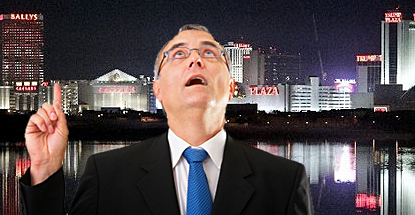 Depending on your point of view, Atlantic City casinos’ October gaming revenue either rose 13.9%, fell 4.4% or rose 19.3%.
Depending on your point of view, Atlantic City casinos’ October gaming revenue either rose 13.9%, fell 4.4% or rose 19.3%.
The Division of Gaming Enforcement reported October’s revenue tally at $207.2m, which is 4.4% less than it reported in the same month last year. But that month enjoyed $43.2m in revenue from four casinos that have since closed their doors, leaving the eight (for the moment) surviving casinos up 19.3%. However, once you subtract the $9.5m earned this month via online gambling revenue, which wasn’t available last year, the apples-to-apples brick-and-mortar revenue is up 13.9% to $197.5m.
As ever, the Borgata ruled the revenue roost, reporting $52.1m in brick-and-mortar revenue, up 9.4% year-on-year. Harrah’s placed second with $32.3m (+16.8%) and Caesars wasn’t far behind with $30.2m (+12.8%). The Tropicana gained a whopping 57% to $21.7m, having won $4.2m at its gaming tables versus a $780k loss in October 2013, while its slots win rose by $3m. All in all, a good month for the Trop. The rest of the pack finished thus: Bally’s ($17.5m, +1.4%), Trump Taj Mahal ($16.7m, -17.4%), Golden Nugget ($15m, +56.8%) and Resorts ($12.2m, +14.6%).
Thursday also brought a warning from Trump Entertainment Resorts that it would close the Taj Mahal by Dec. 12 if its workers’ union didn’t drop its appeal of the court order that killed off the Taj employees health and pension plans. The company says it will make good on its threat if the appeal isn’t withdrawn by the end of the month. Company CEO Robert Griffin didn’t mince words in a letter to Taj staff this week, calling the casino “a very sick patient lying on his death bed.”
On Wednesday, Gov. Chris Christie held a summit with AC casino execs, labor leaders and local officials to brainstorm on ways to right AC’s sinking ship. Among the proposed solutions is the appointment of an emergency manager with “extraordinary supervisory powers” over AC’s spending and taxing. Casinos would also be allowed to make “alternative tax payments” for the next seven to 10 years, because “each incremental casino closure results in a greater tax increase than revenue increase for the surviving casinos.”






